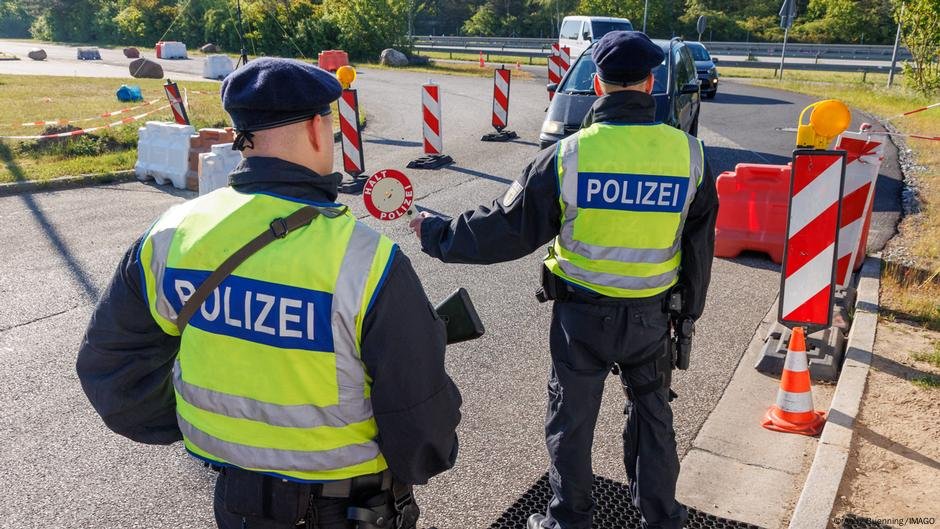Germany’s government is defending border rejections despite a court ruling deeming them unlawful. Legal experts warn the practice likely violates EU law and could lead to more legal challenges. InfoMigrants spoke to legal expert Sebastian Korsch from the University of Konstanz to discuss the legal implications of the ruling.
Chancellor Friedrich Merz and Interior Minister Alexander Dobrindt have reaffirmed their commitment to maintaining strict border control policies, despite a recent court ruling declaring the rejection of asylum seekers at the German border unlawful. The decision has sparked sharp criticism from opposition parties, legal experts, and even members within the ruling coalition.
Speaking at the Municipal Congress of the German Association of Cities and Municipalities in Berlin, Chancellor Merz acknowledged the recent decision by the Berlin Administrative Court but insisted that legal leeway still remains. "The ruling may have narrowed the scope slightly, but it hasn’t eliminated it," said Merz. "We can still carry out rejections, and we will continue to do so to protect public security and prevent overburdening the country."
The Berlin court had ruled in favor of three Somali nationals who were denied entry without undergoing the EU’s mandatory Dublin procedure, which determines which member state is responsible for processing their asylum claim. The court deemed the rejections unlawful and emphasized that such actions, absent due procedure, are broadly incompatible with European law.
Read AlsoGermany's asylum rejection policy faces multiple inroads – not only at borders
Do these rejections fall under Article 72?
Interior Minister Alexander Dobrindt, who introduced intensified border checks in early May, echoed Merz's position, asserting that the current practices remain in accordance with EU law. He cited Article 72 of the Treaty on the Functioning of the European Union, which allows for exceptions to safeguard public order and internal security.

Speaking to InfoMigrants, Sebastian Korsch, a legal researcher at the University of Konstanz, noted that Article 72 TFEU is challenging to interpret because it lacks a clear definition of "emergency." He emphasizes that any suspension of the Dublin procedure must be assessed on a case-by-case basis, and political declarations alone are insufficient justification.
"There is no formal requirement for a public declaration of a state of emergency -- but authorities must provide a legally sound justification for their actions," he adds.
Furthermore, such administrative acts are subject to judicial review. If authorities wrongly invoke an emergency, they face significant legal risk -- even though criminal consequences for individual officers are unlikely in practice.
It is also worth noting that NGOs play a key role in scrutinizing and holding authorities to account. In this specific case, says Korsch, "it is notable that NGOs actively supported the lawsuit because the individuals affected often do not have the means to sue on their own."
He tells InfoMigrants that, "going forward, we can expect further cases brought with support from civil society and strategically selected to influence higher court rulings."
Read AlsoEurope's patchwork of rights: Study finds wide disparities in protections for irregular migrants
Are these rejections lawful?
Dobrindt argued that irregular migration is straining Germany’s integration systems -- from kindergartens to healthcare -- and claimed this could legally justify continued rejections. "We believe the rejections are lawful," he told media, suggesting that the government could present stronger evidence of a national emergency in future legal proceedings.
However, Korsch disagrees: "If someone requests asylum at the border, EU law requires Germany to first examine which member state is responsible under the Dublin Regulation. An immediate rejection without such a procedure is not legally compliant."

He also notes that in practice, proper procedures for refusal or return often do not take place. "In the case of Poland, for example, the federal police sometimes carry out rejections without submitting a formal request to the neighboring country -- even though this is required under international and EU law. A verbal request (e.g., via telephone) can be permissible but must be properly documented and traceable."
In terms of personal legal risks for federal police officers, Korsch states that these are "currently low." Criminal liability or personal accountability is unlikely, as long as there is still room to argue that the legal situation remains unclear.
He explains that "the actual risk lies with the authorities themselves: if they act contrary to court rulings, they enter a legally precarious situation. This can lead to the annulment of measures, claims for damages, or increased political pressure."
Read AlsoBavaria sees decline in numbers of asylum seekers
Is the court's decision binding?
However, other migration law experts have also cast doubt on the government's interpretation of the effects of this court ruling. Winfried Kluth, chair of Germany’s Expert Council on Integration and Migration, told Tagesschau the Berlin ruling aligns with prevailing legal opinion and European Court of Justice (ECJ) jurisprudence. “The notion that a national emergency justifies bypassing EU rules is legally tenuous,” he noted.
Korsch explains that in principle, the Berlin Administrative Court’s decision "formally only applies to the parties directly involved and does not have a binding effect on other administrative courts or the federal police."
He states that "the reasoning behind the ruling is detailed and broadly formulated, so it extends beyond the specific case. Whether other courts will follow this reasoning remains to be seen." In preliminary legal protection, there are often differing assessments -- even within the same court, for instance, in different chambers.
Korsch notes that binding rules for authorities only emerge when several courts or higher courts -- such as the Higher Administrative Courts or ultimately the European Court of Justice (ECJ) -- issue corresponding decisions. "Only then can we speak of a uniform and binding legal situation," he says.
Read AlsoRefugees and asylum seekers in Germany: Five things to know
Widespread criticism
The ruling has triggered widespread backlash. Justice Minister Stefanie Hubig (SPD) urged the government to respect judicial decisions. "In a constitutional democracy like Germany, the government must comply with court rulings," she said, although she acknowledged that the ECJ has the final say on EU law interpretation.
SPD parliamentary leader Matthias Miersch stated that blanket rejections are no longer viable, and party colleague Ralf Stegner called the CDU/CSU’s rhetoric "unsustainable in practice."
Green Party co-leader Britta Haßelmann described the court ruling as a "resounding slap in the face" for Merz’s unilateral approach. "Law has been broken, and this must not continue," she warned. Left Party leader Jan van Aken accused the government of scapegoating migrants and engaging in divisive rhetoric to distract from broader policy failures.
Legal scholar Daniel Thym acknowledged that border rejections might be legal under certain conditions but criticized the government for failing to provide adequate justification in court. "If the government offers a sound legal argument based on integration challenges, courts may rule differently in the future -- but that hasn't happened yet," Thym was quoted by Tagesschau as saying.
Read AlsoGerman Cabinet approves stricter asylum measures
Legal uncertainty and political risk
Though the court’s ruling formally applies only to the three Somali plaintiffs, its reasoning was general enough to challenge the broader legality of Germany’s border policy. The court explicitly rejected the government's claim of a national emergency and concluded that prior arguments were insufficient.
Dobrindt has suggested that further justification could be provided in upcoming proceedings. However, since the plaintiffs in the current case have already achieved their goal through the expedited ruling, the main trial may not proceed.
Other similar lawsuits may now arise in different jurisdictions, such as at the Munich Administrative Court for cases at the Austrian border. A referral to the European Court of Justice (ECJ) could ultimately decide the matter definitively.
Migration expert Gerald Knaus predicted that the government would lose future cases. “All such cases will fail in court, even up to the European Court of Justice,” he said. “The only question is how long the government plans to keep this up.”

Korsch, agrees with Knaus, saying it is unlikely that the ECJ would side with the German government. "We are already seeing a lack of a consistent approach within the federal government -- there are contradictions between the federal police and the Interior Ministry, for example. The situation appears rushed and lacks a coherent strategy."
He argues that any attempt to invoke a national emergency as a basis for suspending Dublin obligations is "highly unlikely to succeed" under current ECJ jurisprudence. Adding that the "threshold for lawfully suspending existing legal obligations is very high -- and so far, there is no convincing evidence that this threshold has been met."
While the government remains steadfast in its border control approach, legal experts and courts are increasingly challenging its justification. Without clear evidence of a national emergency, the government risks mounting legal defeats, potentially up to the European Court of Justice.
Read AlsoGermany to loosen rules regarding 'safe countries of origin' for migrants
